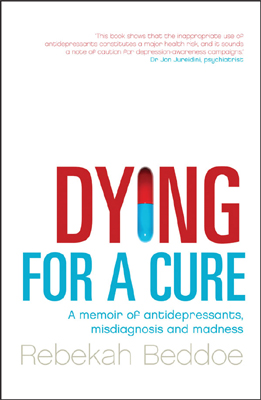Dying for a Cure

There was that term again, depression, being tossed around. When had I received an official diagnosis, anyway? It had just been mentioned by my GP and now staff were picking it up and running with it. Things seemed to be getting blown out of proportion.
I wanted to know why I couldn't be tested for this so-called imbalance in my brain before being put on medication, but I didn't want him to think I was questioning his expertise. He was the second doctor now to recommend the treatment. "And these are the newer sort - the ones that aren't addictive or anything?""Not addictive. They're very safe."
Shortly after the birth of her daughter Rebekah Beddoe was diagnosed with post-natal depression. Two years later she was taking six different drugs, including lithium, a tranquilliser, an antipsychotic, and antidepressants. She had been diagnosed with bipolar disorder; given electric-shock therapy; made numerous attempts on her life; and was alternately manic and consumed by crippling despair during which she could barely move. She had a two-year-old daughter she hardly knew and a mother and partner who were at their wits' end, unable to recognise the formerly ambitious, vibrant and highly successful woman they loved.
Australians have embraced antidepressants: twelve million prescriptions are written annually, mostly by GPs. But, what do we really know of the pills' effects? The idea that they correct a chemical imbalance in our brain is by no means proven - there is much evidence that contradicts this view. It is commonly thought such drugs are not addictive; in fact - as Rebekah found to her great distress - they are hard to come off and those who do may suffer debilitating side effects.
This is a powerful memoir of the nightmarish three years Rebekah endured as she was repeatedly misdiagnosed, only to realise that her medication was the cause of her mental deterioration. Rebekah calls for better information from the pharmaceutical companies about the risks associated with antidepressants and similar classes of drugs - facts, rather than marketing dressed up as medical science - and for a re-examination of the ways some psychiatrists treat their patients.
About Rebekah BeddoeWhile suffering what was then diagnosed as post-natal mental illness, Rebekah Beddoe began studying professional writing with a view to writing about her experiences living with this condition. Ironically, before she'd put pen to paper the real cause of this erroneous diagnosis was becoming apparent. In a sharp twist, what was to be a documented journey of a slide into chronic mental illness, instead became her book DYING FOR CURE. Rebekah, now in her thirties, lives with her husband, daughter and very spoilt Labrador golden retriever cross.
Dying for a Cure
Random House Australia
Author: Rebekah Beddoe
ISBN: 9781741664782 / 1741664780
RRP: $34.95
Review: In today's society women inflict pressure upon themselves to be the perfect mother, wife, family member and businesswoman all at once. It is therefore no surprise that there has been increase in post natal depression & depression. Rebekah Beddoe is passionate, raw and paints a brutally honest picture of her struggle and the behaviour that goes with her illness.
MORE
- Dr Linda Swan World Health Day: Depression:...
- Helping To Change Perception Of Suicide And...
- Am I Worried, or is this Anxiety?
- Jack Heath Depression in Australian Workplaces...
- The Importance Of Getting Help For Your Fears...
- Managing Your Fearful And Obsessive Thoughts
- Ending Your Life Is Not The Answer To Your...
- When Your Friends Do Not Understand Your Mental...
- How To Find A Good Mental Health Counselor
- Exercise Effective Remedy For Depression
- Addicted To Being Busy



